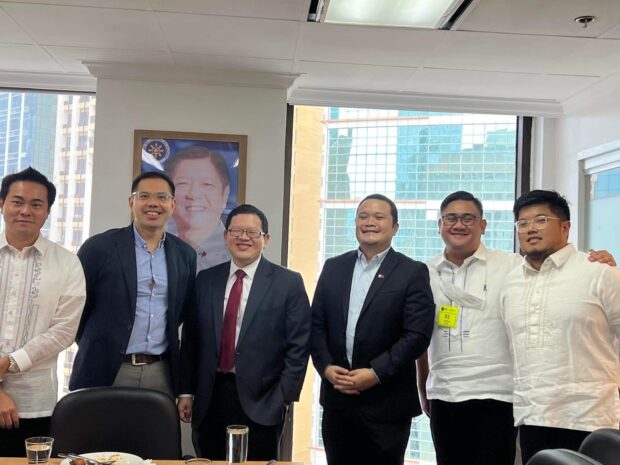On March 29, 2023, I had the privilege of attending the blessing of the newly renovated office of the Securities and Exchange Commission (SEC) in Makati City.
Most people think of the SEC as the government office where one goes to incorporate a company, partnership, or association, as well as to request copies of company registration documents.
It is no longer just that.
The present day SEC has come a long way from the original body which was created by Commonwealth Act No. 83 way back in Oct 26, 1936. At the time of its creation, the SEC was under the direction of a single commissioner.

From left: Atty. John Philip Siao, Atty. Greg Joseph Tiongco, SEC Commissioner Javey Paul Francisco, SEC Chairman Emilio Aquino, Fr. Eric Castro, SEC Commissioner Mcjill Bryant Fernandez and SEC Commissioner Karlo Bello

From left, Atty. John Philip Siao, Atty. Greg Joseph Tiongco, Commissioner Kelvin Lee, Commissioner Karlo Bello, Atty. Manuel Lasam, Atty. Ma-yr-zar Martin Teruel.
The SEC was reorganized in 1975 to become a collegial body with three commissioners. It was also given quasi-judicial powers over intra-corporate disputes and exclusive jurisdiction and control over all corporations under Presidential Decree No. 902-A.
The leadership of the SEC was later expanded to five: headed by a chairman, and four commissioners.
As a result of the stock market scandal involving BW Resources Corp. back in 1999, Congress fast-tracked the passage of the Securities Regulation Code (SRC) in order to amend the Revised Securities Act, which was the law in place at the time of the scandal. The new law tightened stock market rules, and gave the SEC stronger regulatory authority over market players.
The passage of the SRC in 2000 resulted in a fundamental shift in the SEC’s mandate, toward one focused on developing a fair, efficient, and transparent capital market. Up until the enactment of the SRC, SEC’s role in developing the Philippine capital market was much less than what was called for. (www.sec.gov.ph)
Today, the SEC is headed by Chairman Emilio Aquino, who is supported by Commissioners Jayvey Paul Francisco, Kelvin Lester Lee, Karlo Bello, McJill Bryant Fernandez, who are all very skilled, capable, and professional lawyers.
Aside from the laws mentioned, other significant and relevant laws involving the SEC form the core of its regulatory framework and authority such as The Corporation Code and the Revised Corporation Code, Investment Company Act, The Investment Houses Law, The Financing Company Act, The Lending Company Regulation Act of 2007, The Anti Money Laundering Act, Personal Equity and Retirement Act of 2008, and The Credit Information System Act, and The Real Estate Investment Trust Act.
Aside from company registration and documentation, the SEC is the primary regulator of the Philippine securities market and is responsible for maintaining a fair, efficient, and transparent capital markets. The past few years have seen the SEC make significant strides in improving the country’s financial markets, protecting investors, and promoting transparency.
To do this, the SEC has had to adapt quickly to challenges which were mostly ushered in by advancements in technology.
The SEC has in itself been quick to adapt technology to improve its own efficiency and nowhere is this more evident than in the commission’s e-governance platforms which have greatly enhanced the delivery of its services.
Online tools in the SEC’s website such as the eSPARC and eSPAYSEC allow for the electronic processing of company registrations and payment of registration, transaction fees and penalties using debit and credit cards, digital wallets, and other cashless options. The SEC eFAST and Express allow for the online submission of periodic reports such as the audited financial statements, general information sheets, sworn statements, and other special forms and reports, as well as for a system of requesting copies of corporate registration documents and reports to be delivered to one’s doorstep.
On March 15, 2023, the SEC also issued Memorandum Circular No. 2, which implemented an amnesty program for the non or late filing of the general information sheet and annual financial statements, as well as non-compliance with Memorandum Circular No. 28, 2020, which requires parties to perform transactions online by registering company or entity representatives and email addresses with the SEC.
The financial markets is one area where technology has brought a lot of challenges and the SEC has had to quickly address problems that came with it.
In mid 2010s, there was the proliferation of online lending platforms introduced by several financial technology (fintech) startups offering “payday loans” or small loans ranging from P5,000 to P15 ,000. The growth of this industry was triggered by widespread internet access, mobile device adoption, and increasing demand for quick and convenient loan services by Filipinos.
The ugly part was that interest on these loans could reach upwards 25 percent a month and, since it was estimated that millions of Filipinos had availed themselves of these loans, problems such as abusive collection practices became commonplace.
The SEC took the initiative to work with the Bangko Sentral ng Pilipinas (BSP) which resulted in the BSP Circular No. 1133 Series of 2021 where, not since the lifting of the law against usurious interest, the BSP set maximums on the nominal, effective and interest rate and late payments rates on loans.
Aside from this, the SEC has revoked the certificates of registration of more than 2,000 lending and financing companies, has actively prosecuted erring financing and lending companies and operators, worked with the Google Play Store for the removal of unregistered online applications and implemented a moratorium on new online lending applications pending the formulation of new rules and regulations to ensure proper compliance, monitoring and prevent abusive practices.
The SEC has also been active in going after and warning the public on the illegal sale of securities and sale of investments by businesses which usually come in the form of investment contracts, whereby the investor is invited to put in a certain amount of money, which the company represents will earn a certain amount in a given period of time. These businesses usually do not have the proper permit to offer and sell such securities and would offer their “investment offerings” on the internet, especially on Facebook.
Seeing the need of funding for businesses, the SEC has presented “crowdfunding” as an accessible and convenient means for startups and SMEs to secure support and funding from the public for a business idea through an online platform.
There is also the PhiliFintech Innovation Office established by the SEC, in order to understand and better regulate the use of fintech in the Philippines. This office is intended to serve fintech companies applying for registration or those existing fintech companies operating or which have new fintech products and assist them in navigating the SEC’s regulatory landscape.
The SEC is also drafting rules on digital asset exchanges to ensure that the exchange of such assets meet global standards on investor protection, market integrity, and transparency.
On Jan 19, 2023, the SEC partnered with the University of the Philippines Law Center (UPLC) to improve the formulation of policies that could better address the regulation of fintech in the country. Under the partnership, the UPLC will provide aid in the creation of a legal and regulatory framework to initially address issues surrounding cryptocurrencies, before focusing on other fintech products and their corresponding regulation.
The SEC is indeed looking good and ready.
(The author, Atty. John Philip C. Siao, is a practicing lawyer and founding Partner of Tiongco Siao Bello & Associates Law Offices, teaches law at the MLQU School of Law, and an Arbitrator of the Construction Industry Arbitration Commission of the Philippines. He may be contacted at jcs@tiongcosiaobellolaw.com. The views expressed in this article belong to the author alone.)

